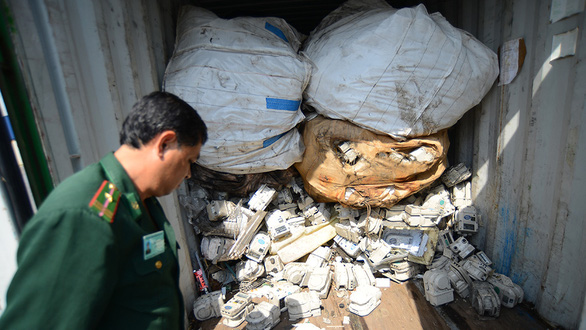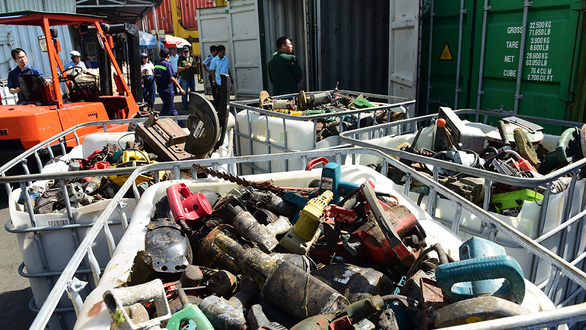Authorities in Ho Chi Minh City are scratching their heads over how to deal with more than 600 shipping containers of scrap material as they have been unable to re-export the shipments or contact either the senders or the recipients.
A total of 1,099 shipping containers of unqualified scrap, many of which contain impurities and toxic substances harmful to the environment, have been stored at the city’s ports and needed to be exported back to where they came from, an official from the municipal customs department told Tuoi Tre (Youth) newspaper.
The department has sent letters to 30 shipping lines and shipping agencies in Vietnam, but only 15 of them have suggested solutions for 484 of the shipping containers.
Among them, 67 are expected to be discarded while the other 417 will be re-exported.
It now remains unclear how the remaining 615 containers will be dealt with.
“Local shipping lines said they were unable to contact both the senders and recipients, while the goods do not meet enough requirements to be re-exported to other countries,” said Nguyen Thanh Long, deputy head of the customs office at Cat Lai Port.
As the scrap does not meet technical regulations on environmental protection for import, while storage fees have become much higher than the value of the shipments, many businesses have decided to abandon the goods, Long elaborated.
Customs agencies and port operators have reduced storage fees by 80 percent and repeatedly asked local businesses to receive these shipping containers, but the problem remains unsolved.
The Ho Chi Minh City customs department has only been able to return 39 shipping containers so far, while the rest are being stored at Hiep Phuoc Port.
All proposed solutions have been submitted to the General Department of Vietnam Customs for a final decision.
|
|
| Authorities examine containers of unqualified scrap at a port in Ho Chi Minh City. Photo: Quang Dinh / Tuoi Tre |
According to current regulations, shipping containers that meet import requirements will be put up for auction, while those unqualified must be re-exported.
If shipping lines fail to re-export the unqualified goods within 30 days after being informed by customs agencies, the containers will risk being discarded, while the shipping lines may face a revocation of their export/import licenses.
Local shipping firms believed that this is a harsh penalty, adding they have been facing difficulties in the re-export of such shipments.
“Re-exporting a shipping container requires sales invoices between the seller and the consignee,” a representative of a local shipping line said.
The most feasible solution is to dispose of these containers, and shipping lines have to pay for part of the cost as this is a type of operational risk, the director of a local company suggested.
The remaining cost of the disposal process can be paid by money from the auction of qualified containers, he added.
Like us on Facebook or follow us on Twitter to get the latest news about Vietnam!


















































